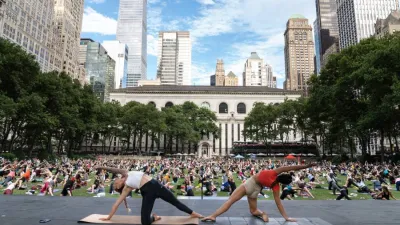According to Philip Myrick, communities that will fare the best economically are the ones that think locally and employ placemaking strategies.
"Placemaking is central to many of the powerful trends shaping the world today. The stumbling global economy, a vulnerable energy supply, and loss of confidence in far-flung markets are balanced by an upsurge of interest in things local: producing local food; promoting local businesses; preserving local character; protecting local open space and public places; finding meaningful ways to belong to a local community.
New economic theories point out that our city and regional economies may no longer function as they once did, but have been turned upside-down. This research suggests that human and creative capital of our communities are now the catalysts of economic growth rather than mere results of that growth.
According to Soji Adelaja, Director of the Land Policy Institute (LPI) at Michigan State University, keeping and attracting people is the most important strategy in this new economic landscape. Services, which are inherently local and include everything from doctors' visits to construction projects, now account for a larger share of the economy than goods. A Land Policy Institute study shows that half of total economic losses stemming from drops in population are caused by a loss of service jobs and income. That means when people move they take a piece of the economy with them."
FULL STORY: How Your Community Can Thrive-- Even in Tough Times

Planetizen Federal Action Tracker
A weekly monitor of how Trump’s orders and actions are impacting planners and planning in America.

Chicago’s Ghost Rails
Just beneath the surface of the modern city lie the remnants of its expansive early 20th-century streetcar system.

San Antonio and Austin are Fusing Into one Massive Megaregion
The region spanning the two central Texas cities is growing fast, posing challenges for local infrastructure and water supplies.

Since Zion's Shuttles Went Electric “The Smog is Gone”
Visitors to Zion National Park can enjoy the canyon via the nation’s first fully electric park shuttle system.

Trump Distributing DOT Safety Funds at 1/10 Rate of Biden
Funds for Safe Streets and other transportation safety and equity programs are being held up by administrative reviews and conflicts with the Trump administration’s priorities.

German Cities Subsidize Taxis for Women Amid Wave of Violence
Free or low-cost taxi rides can help women navigate cities more safely, but critics say the programs don't address the root causes of violence against women.
Urban Design for Planners 1: Software Tools
This six-course series explores essential urban design concepts using open source software and equips planners with the tools they need to participate fully in the urban design process.
Planning for Universal Design
Learn the tools for implementing Universal Design in planning regulations.
planning NEXT
Appalachian Highlands Housing Partners
Mpact (founded as Rail~Volution)
City of Camden Redevelopment Agency
City of Astoria
City of Portland
City of Laramie





























